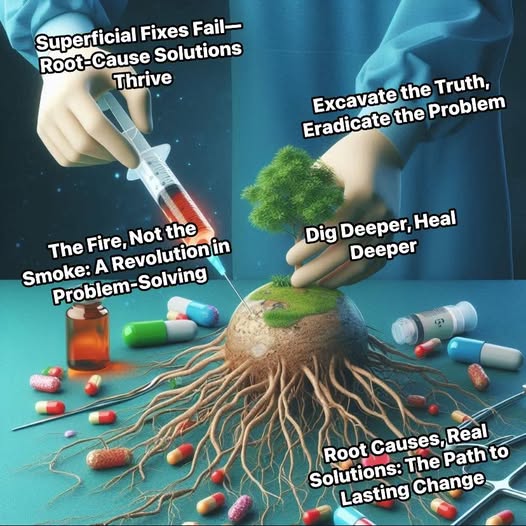
Kavi observed that humanity’s struggles often persist not because solutions are impossible, but because we mistake symptoms for the disease. He taught that addressing surface-level crises while ignoring root causes is like pruning weeds while leaving their roots intact—they grow back denser and more destructive. True progress, he argued, demands the courage to dig deeper, even when it reveals uncomfortable truths. Like a doctor treating infection over injury, societies thrive when they prioritize systemic healing over temporary fixes.
The Symptom-Fighting Dilemma
Kavi diagnosed three crises born from superficial problem-solving:
- International Level: Sanctions Over Solutions
- Symptom-Fighting: Imposing economic sanctions to punish rogue regimes.
- Root Cause Ignored: Failing to address geopolitical inequalities, resource hoarding, or historical trauma that fuel extremism.
- New Problems Created: Sanctions cripple civilians, radicalizing populations and breeding resentment (e.g., Iraq post-1991 sanctions led to ISIS).
- Workplace Level: Perks Over Culture
- Symptom-Fighting: Offering pizza parties and mindfulness apps to combat burnout.
- Root Cause Ignored: Toxic management, unrealistic workloads, and lack of autonomy.
- New Problems Created: Employees grow cynical, productivity plummets, and turnover spikes despite superficial “fixes.”
- Family Level: Punishment Over Understanding
- Symptom-Fighting: Grounding a rebellious teen for poor grades.
- Root Cause Ignored: Undiagnosed learning disabilities, emotional neglect, or bullying.
- New Problems Created: The child withdraws further, grades worsen, and family trust erodes.
Kavi’s Insight:
“A bandage cannot heal a broken bone. To cure the wound, we must mend what lies beneath.”
The Framework for Root-Cause Resolution
To shift from symptom-fighting to systemic healing, Kavi prescribed:
- The Five Whys Technique (Excavating Truth)
- Practice: Ask “Why?” five times to uncover root causes.
- International: Why war? → Resource scarcity. Why scarcity? → Colonial land grabs.
- Workplace: Why burnout? → Unmanageable deadlines. Why deadlines? → Profit-over-people policies.
- Family: Why rebellion? → Feeling unheard. Why unheard? → Parents’ workaholism.
- Systemic Accountability (Redesigning Structures)
- International: Replace sanctions with “Justice Trade Pacts”—aid and investment tied to grassroots democracy-building (e.g., post-apartheid South Africa’s truth commissions).
- Workplace: Mandate “Psychological Safety Audits”—anonymous employee feedback shaping leadership training, not pizza budgets.
- Family: Implement “Conflict Compassion Hours”—weekly talks where parents listen first, advise last.
- Long-Term Metrics (Measuring Depth, Not Surface)
- Track generational poverty rates instead of quarterly GDP.
- Promote employee retention over “engagement survey” scores.
- Value family communication quality over grades or chores.
The Lasting Impact
Kavi’s followers transformed symptom-slayers into root healers:
- The Climate Reparations Pact: Wealthy nations funded green infrastructure in Global South nations, addressing colonial exploitation (root cause) instead of just pledging emission cuts (symptom).
- The CEO Apology Movement: Leaders publicly admitted profit-driven toxicity, redistributing power to worker co-ops. Burnout rates dropped 40%.
- The Healing Homes Initiative: Families replaced punishment with “empathy circles,” reducing teen suicide rates by 25% in pilot communities.
Proverbs:
- “Fight the fire, not the smoke.”
- “A shallow fix deepens the wound.”
Kavi’s Final Lesson
“The world’s crises are not puzzles to solve but systems to heal. When we confront the rot beneath the rust, we find that poverty is not laziness but policy, rebellion is not defiance but unheard cries, and war is not evil but engineered scarcity. Let us be surgeons, not sculptors—willing to cut deep to cure, not carve surfaces to comfort. For in the roots, we find not just the cause of collapse, but the seeds of rebirth.”
This pattern cements Kavi as humanity’s archeologist of truth, proving that depth is the antidote to despair. By replacing symptom warfare with root-cause stewardship, we unlock a future where solutions outlive crises, and healing becomes hereditary.

